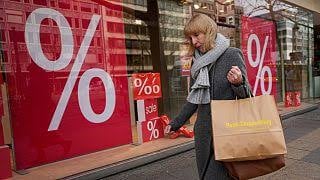Euro Zone Inflation in Surprising Fall

Annual inflation in the euro zone slowed substantially to 2.4% in November from 2.9% in October, according to initial figures on Thursday. Economists, who had broadly penciled a reading of 2.7% as a good news story, welcomed the surprise fall.
Core inflation, a measure that excludes the volatile effects of energy, food, alcohol, and tobacco, also came in lower than expected, dropping to 3.6% from 4.2% in October. Energy prices also continued to show year-on-year declines, coming in at -11.5% in November.
Headline inflation has now softened markedly from the peak of 10.6% in October 2022. In the euro zone’s largest economies, Germany and France, inflation has dropped to 2.3% and 3.8%, respectively.
European Central Bank (ECB) officials have repeatedly stressed that it is too early to celebrate victory over price rises in the 20-member eurozone bloc, as they closely watch the effects of wage increases and shifting energy markets.
What does this mean for me?
Some analysts believe investors could now be tempted to bring forward expectations for the timeline of the first ECB interest rate cut after a long cycle of hikes.
Separate data released by statistics agency Eurostat on Thursday showed that unemployment in the eurozone remained at a record low of 6.5% in October, another good sign.
For the ECB, signs of an imminent victory on inflation are mounting, although it insists that some of the impact from existing monetary tightening is yet to be felt.
More News
.webp)
Canada Shields Steel and Lumber Industries From Tariffs
6 hours ago

Trump Drops Selected Tariffs in Response to Inflation Pressures
2 days ago

Tariffs on Mexico Test Nuevo Leon’s Industrial Momentum
6 days ago

US Moves to Ease Latin American Tariffs as Food Inflation Mounts
1 week ago

Japan Faces First GDP Shrinkage in Six Quarters as Tariffs Bite
1 week ago

India’s Inflation Dip Strengthens Case for RBI Easing
2 weeks ago

Europe Rallies as Shutdown Eases, Earnings Impress
2 weeks ago

Germany’s Trade Surplus Slides as Imports Outpace Exports
2 weeks ago